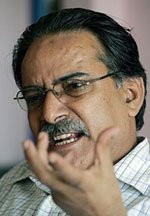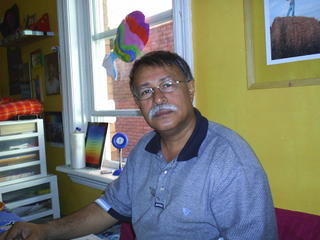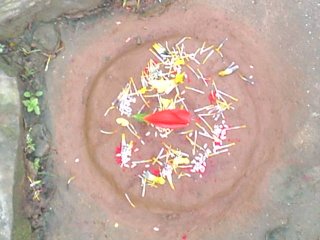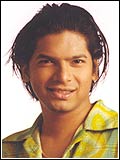
INTERVIEW WITH PRACHANDA
Excerpts of a recent interview with Chairman of the Communist Party of Nepal (Maoist), Prachanda alias Pushpa Kamal Dahal:
Q. Which name do you prefer to be addressed by- Chairman, Prachanda or Puspa Kamal Dahal?
Prachanda: I prefer Chairman and Prachanda. The name Puspa Kamal Dahal represents a certain culture while the name Prachanda represents a feeling and ideology that intends to take the whole country forward independently. Therefore, I want that all of my friends and the Nepali people recognise me with the name Prachanda.
Q. Your name has caused a big shake-up in the political sector. You remained underground for 25 years. Now you have abandoned the underground life and entered public life. How do you feel?
Prachanda: I had a different life before I went underground. I used to teach Science in High School. I was involved in politics as well. I was a member of the Party. We boycotted the Panchayat elections of 2038 BS. Then I became totally underground. My situation after the 1990 popular movement was almost like it is today. I was open to the media and was not completely underground. A totally new process began after the start of the People's War (in 1996). Now the situation is somewhat similar to 1990.
Q. You have suddenly landed on the liberal political ground from a violent political base, especially after the 12-point understanding with the seven parties. What were the reasons behind the understanding?
Prachanda: Our political base was not that rigid. Ours is a party which had to wage a People's War for just rights despite entering Parliament. We were the third largest party in Parliament.... We lawfully tried to raise some issues- issues related to nationality, people's daily requirements and democracy- even back then. We are not rigid. What we said even after starting the People's War is that we are not communists of the traditional type. Even after the start of the People's War, we have always been ready to accept the people's verdict. We had told the government during the very first peace talks let's hold constituent assembly elections; that the solution to our problem lay there. We were never into rigid politics. We were very much wide and flexible.
Q. You took up arms for political change. Isn't that rigid?
Prachanda: To take up weapons is just a form of politics. I don't think you become rigid once you take up arms. Taking up weapons is also a form of flexibility.
Q. While talking about dialogue and sustainable peace, you once said, in a different context though, that even the king was acceptable?
Prachanda: I didn't say this in that sense. What I had said is we are ready to accept what the people decide through constituent assembly elections. We are ready to accept if the people's verdict is in favour of the king or monarchy...The situation was different when Birendra was the king. In our understanding, the relevance of king and monarchy ended after the royal palace massacre.
Q. You said the relevance is over. But you twice held talks with the governments of the same irrelevant king. What was the compulsion?
Prachanda: The relevance is over indeed. Right after the royal palace massacre, we said the institutional development of republicanism was necessary in Nepal. We are still firm and clear on this stand. As regards to the issue of talks; a war was on between two forces. The initiatives for talks had been taken to avoid further bloodshed between the two sides. It didn't mean we accepted the relevance of monarchy.... When the UML and Deuba were in power last time, we said we would hold talks with the master not with the servants. Because we thought talks would mean something only if we knew who had the real power. Enough talking was done with the parties. But nothing happened.
Q. Who first saw the need for the 12-point understanding after the king began his direct rule- you or the parties?
Prachanda: On our part, we had seen the historic importance of the unity between our party and the parliamentary parties right after the royal palace massacre. But the seven parties didn't listen to us. We had said also in the Siliguri (India) meeting that a working unity was needed between the parties and us. On their part, the seven parties, too, couldn't do much for the people in the democratic period. The parliamentary parties were so much indulged in their power games that they could not grasp what we were trying to say, or let's say we could not make them understand properly. Their situation was totally different after February 1, 2005. Then the seven parties came and we signed the 12-point understanding.
Q. Had any international power pushed you or the seven parties towards each other?
Prachanda: It's both. If you talk negatively, Gyanendra pushed us towards each other. His negative actions pushed us towards each other. I doubt if this change would have come, hadn't some international powers, mainly India, urged us (Maoists and parties) to "do something" jointly. Had the seven parties somebody who could think independently, the country would have been different right after the royal palace massacre. The country would not have suffered this much, had there been leaders who could think for themselves. This time, India helped the 12-point understanding in a positive way.
Q. To the seven parties?
Prachanda: Let's not say seven parties; mainly the UML and the Nepali Congress.
Q. But no understanding seems to be building between you and the UML?
Prachanda: It is building as per the need. They, too, are in the seven-party alliance, apparently. Let's say it's building. But they might be thinking that they would lose their ground if we enter peaceful politics. In our opinion, it's a narrow-minded thought. Let me tell you one thing, our talks team was in Kathmandu during the first round of talks. We were raising the issue of constituent assembly. There was a wave of encouragement among the people. The then Prime Minister Deuba was not in a position to do anything on the issue of constituent assembly. After we realised that the peace talks were going nowhere, we planned to attack Dang. After the attacks in Dang, the UML leaders became happy. May be they thought that it would be a great loss to the UML if we entered peaceful politics. But this was not on our mind. We were concerned about giving an outlet to the crisis and taking the country forward. They thought "Thank God! You saved us" when we attacked Dang.
Q. A huge shakeup took place after the 12-point understanding. The House of Representatives was restored and it took a lot of decisions. You have come out in public and look very calm and relaxed. It seems as if you are eagerly enjoying the talks. What is the truth?
Prachanda: This is not the truth. Though it looks that way, it's not like that. The 12-point understanding was reached after a lot of hard work. This is something our party had been thinking about for the past four years. Our Indian friends had contacted and talked with us before the king's coup. We were in Rolpa then. But the right environment for it was created only after Gyanendra took over on February 1. There isn't that much brainwork done by the seven parties behind the 12-point understanding. It would have been great had this understanding been built on their (seven parties') own vision. The understanding lacks depth as it was formed amidst the negative moves of Gyanendra and India's advice (to the seven parties and Maoists) to move ahead positively. We had told the seven parties when they put forward the House restoration issue that this will provide the king and monarchy a back door. Even among the seven parties, six were not in favour of House restoration. But the Nepali Congress could not give up this slogan. Girijababu could not abandon it. We knew that a design was hidden in this (House restoration) slogan...We knew this a year before the 12-point understanding was reached. We went ahead with the understanding despite knowing this. We had no other alternative to agitate the Nepali people to a new level of awareness.
Q. Dialogue with India was on while you were still in Rolpa, before the King's coup?
Prachanda: We were in direct contact. Indian friends were there. They said the House should be restored. We said House restoration had no relevance. It is our conclusion that the people have stood up now in this fashion because of the 10-year long People's War and the 12-point understanding. The people stood up under the cover of the 12-point understanding because a direct confrontation through the People's War would lead to much bloodshed. House restoration was not the people's demand. This was not even on their mind. We have taken it (House restoration) as a recurrence of what happened in 1951. Therefore the people still need to be alert.
Q. But the mass movement has stopped?
Prachanda: Rather than saying the movement stopped, let's say it was time to change its form. There was no situation for the movement to go on the way it was going. It was slightly divided as well. There was a change in the political situation.
Q. How can the talks move forward in such an artificial environment?
Prachanda: This thing is very important. We will stick to the dialogue process till the end. It is our objective that a peaceful outlet is found. But the seven-party leaders are creating an artificial environment. They are doing the opposite. Not respecting the people's feelings. We want to keep the pressure on from the ground... If the talks fail, there will definitely be an October Revolution of its own kind in Nepal. We are ready to lead that revolution.
Q. This means you are ready to wait till October?
Prachanda: What I mean, in clear words, is that if the seven parties do not understand by October, then the situation will move towards an October Revolution.
Q. How optimistic are you? Do you doubt Girija Prasad Koirala's honesty?
Prachanda: Rather than Koirala's honesty, how he will run the politics is the major thing. In my first meeting with him three years back, I had told him "You accept a republic, we will accept multiparty. Then the country will become new. Let's make a new Nepal." He had replied immediately, "Congress cannot go for a republic right now." He is still where he was three years back. He mentioned ceremonial king only yesterday. But this ceremonial thing doesn't work in Nepal. This proves how much rigid he is. This concept of a ceremonial king will not work- one, because of the army, and two, because of the king's own character.
Q. Do you personally feel that the talks will be successful?
Prachanda: I don't think the seven-party leaders are in favour of making the talks successful. And I don't think the international power centres, too, are in favour of giving Nepal and Nepalis a forward-looking exit from the current crisis by making the talks successful. To tell you directly, I haven't seen the signs for the talks to be successful. But again, the Nepali people want the talks to be successful and our party, too, wants the same. It depends on how much the people's and our party's initiatives can be taken forward. The talks will be successful if the pressure can be increased.
Q. What kind of republicanism is it that you have been talking about?
Prachanda: There shouldn't be the parliamentary republicanism, which is in practice in other countries, in Nepal. That doesn't solve the problem. There's no question of an autocracy. We need a republicanism of our own kind.
Q. You have envisioned a people's republic, no?
Prachanda: Mao Zedong's People's Republic cannot fulfill the needs of today's world. It cannot address today's political awareness appropriately. Mao said cooperative party theory; we called it competitive party theory. We have said let's move ahead from the conventional People's Republic and develop it as per the specialties of the 21st century.
Q. You do not follow the old concept of communism?
Prachanda: Definitely not. What happened without competition? In the USSR, Stalin gave no place to competition and went ahead in a monolithic way. What was the result?
Q. Let's talk about the economy. The 21st century world is a free-market world. How do you see the open market economic policy?
Prachanda: The economy should not be given a free rein in the name of a free market. We should take the middle way. Words like libralisation and globalisation are being much touted these days. But if you look at it closely, the very supporters of these theories have not implemented it in their own countries. The most powerful countries and America themselves have not implemented it. They have referred it to the poorest countries. Competition has been referred to undeveloped countries. We are against that policy. It's not right.
Q. The country's resources haven't increased. The number of mouths to feed has. In such a situation, do you think the country's development is as easy as you are saying?
Prachanda: I think development is not that difficult a thing. The main thing is what policies and plans the state adopts and what kind of programmes it brings forward for the millions of people. This is the main thing. One hundred years back, we were very much self-dependent. We were not economically weaker than others. If you compare us with many countries of the world, you will know that we are not weak. Others kept progressing and we kept going downhill. We have serious problems in the policies adopted by the state. What I think is if the state has the right programmes and vision, then there are only 200 million mouths but 400 hands. If the 400 million hands are put to work in the right way, imagine where this could take the country in 10 years.
However, we have to cut down certain things to save money. I have been saying that we do not need this 90 thousand-strong army. We can cut it down by 80 thousand. 10 thousand is enough. And then see how much capital we will have. It's not out of any personal grudge that we want to abolish the monarchy. They have amassed hundreds of billions of rupees. Imagine the kind of capital we will have if that is nationalised. Won't miracles happen if we then mobilise the 400 million hands? We can earn millions from our herbs. We have so much Yarchagumba. Let's open processing factories where it is found. Thousands will get jobs and we can earn hundreds of millions of rupees. Money will start growing there.
Q. You just mentioned about decommissioning the army. What will happen to your army?
Prachanda: The same for the Liberation Army. I have also been training them now. There is no use of increasing the number of our army, either. We don't have the status to beat the Indian or the Chinese army even with our 30 thousand and the 90 thousand-strong royal army. We don't have the status to beat anyone. You go through history; the only thing the Nepali Army has done after the Sugauli Treaty is to kill the people. We can ensure security by forming the people into a militia. If all citizens are made to undergo a five-year military training, there will be 250 million soldiers ready. Once that army is ready, even if India or China attacks, we can save the country. But even if we make a 500 thousand-strong army and keep it in barracks, it cannot fight anyone. What's the use of it?
Q. That means the management of arms and armies will not be a stumbling block on the way to a constituent assembly?
Prachanda: In my opinion, it will not and should not. If the seven-party leaders are really serious about the country, peace and development, this problem will not come. It will not come from our side. We are going to put forward this proposal. I have already talked about it. Let's cut down the armies of both sides. Let's train the people into a militia. The militia will maintain law and order. Let's keep the army only to train the people.
Q. Business people, industrialists and entrepreneurs are a little concerned about you. Their fear is if you can give them so many problems as a powerful party, you will squeeze them once in power.
Prachanda: We encourage those who want to develop industries in the country, create jobs, make profits and invest the profits in the country. We are organising a national meet of the capitalists. There, we will invite even those who disagree with us. We want that Nepal's capital does not go outside. We are clear that there will be no development in Nepal unless the capitalists can make some profit. But let that profit not be through exploitation and let it also not go abroad. We are also going to propose to the capitalists to invest where the most profit can be made. We should introduce a strict law to stop those who earn here and deposit the money in America or India.
 Raising a voice
Raising a voice

 INTERVIEW WITH PRACHANDA
INTERVIEW WITH PRACHANDA



